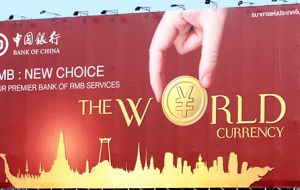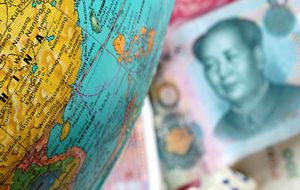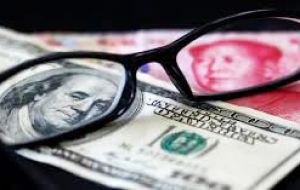MercoPress. South Atlantic News Agency
China's Renmimbi has become world's second most used currency in trade finance
 Markets expect RMB’s market share in trade settlement and payments to continue to grow anticipating China will further open up its financial markets.
Markets expect RMB’s market share in trade settlement and payments to continue to grow anticipating China will further open up its financial markets.  China has entered into more than 30 bilateral currency swap agreements since December 2008.
China has entered into more than 30 bilateral currency swap agreements since December 2008.  As of May 15, 2015, the total value of effective currency swap agreements was RMB 2.9 trillion (US$ 468 billion).
As of May 15, 2015, the total value of effective currency swap agreements was RMB 2.9 trillion (US$ 468 billion).  Argentina's central bank reportedly drew upon its swap line with China to combat a shortage of USD funding in 2014.
Argentina's central bank reportedly drew upon its swap line with China to combat a shortage of USD funding in 2014. As China establishes itself as the world’s second largest economy and top trading nation, its currency, the renminbi (RMB), is also gaining popularity around the world. According to the People’s Bank of China’s 2015 Renminbi Internationalization Report, the RMB was the world’s 5th most used payment currency, the 2nd most used trade finance currency, and the 6th most traded currency in 2014.
Market participants expect the RMB’s market share in trade settlement and payments to continue to grow in anticipation that China will further open up its financial markets.
Although the RMB is not fully convertible in capital account transactions, trade settlement in RMB has surged in recent years, largely thanks to a number of currency swap agreements that China entered with its trade partners. Since the RMB is still not an international reserve currency, bilateral currency swap agreements help enable trade settlement in RMB with the added benefits of improving operational efficiency, lowering transaction costs, and ensuring market confidence.
China has entered into more than 30 bilateral currency swap agreements since December 2008. As of May 15, 2015, the total value of effective currency swap agreements was RMB 2.9 trillion (US$ 468 billion). In 2014, an equivalent of RMB 1.13 trillion (US$ 182 billion) of swaps were conducted under these swap agreements.
These currency swaps can be viewed as a credit line that both sides can draw upon at a pre-determined exchange rate. They are different from the liquidity swap lines that the Federal Reserve established with several central banks during the Global Financial Crisis, which are essentially repo transactions based on prevailing exchange rates.
In contrast, China’s bilateral currency swap agreements are designed to facilitate settlement in renminbi. China’s agreement with Pakistan, for instance, specified that the use of currency swap agreement should be based on either bilateral trade or direct investment transactions.
In practice, however, China’s currency swap agreements have also been activated as a source of liquidity for reasons not directly linked to trade. Again using Pakistan as an example, the country reportedly tapped an equivalent of US$ 600 million (out of a total of RMB 10 billion, or US$ 1.6 billion) under the swap agreement in 2013 to shore up its reserves and averted an imminent currency crisis. Granted, tapping the swap line only had cosmetic effects on the country’s balance of payment statistics, and did not improve the fundamentals of the country’s external positions, but it did provide a way for Pakistan to obtain liquidity at a time of emergency without further adverse impacts on its currency value. (Pakistan eventually got a US$6.6 billion loan from the IMF that helped stabilize its economy.)
In a similar move, Argentina reportedly drew upon its swap line with China to combat a shortage of USD funding in 2014.
China does not provide USD liquidity under bilateral currency swap agreements, but both Pakistan and Argentina were able to convert RMB to USD in the offshore RMB market. In other words, swap agreements have made it possible for China’s counterparts to navigate troubled times on the back of China’s vast foreign exchange reserves and its strong currency.
At the moment, the total size of such swaps is still small when compared with China’s foreign exchange reserves, but further expansion of these programs could pose new challenges for managing RMB exchange rates. In a scenario where foreign exchange reserves are declining and RMB depreciation expectations are rising, the use of these swap agreements for liquidity purpose can add to downward pressure on the Chinese currency to the extent that the other side sells a large amount of RMB to obtain USD funding.
These concerns can dissipate with further internationalization of the RMB, if the RMB becomes a widely used reserve currency and RMB denominated securities are to gain significance in international capital markets. The upcoming review of the Chinese currency’s inclusion in the IMF’s Special Drawing Rights basket in November is an important step in this direction.
The RMB still has a long journey to becoming a global reserve currency. Still, the steady rise of the RMB appears inevitable given China’s growing economic significance. The US$468 billion (and growing) currency swap agreements not only demonstrate the wider use of RMB, but also highlight China’s growing international responsibilities for its trade and strategic partners.




Top Comments
Disclaimer & comment rules-

-

-

Read all comments“Although the RMB is not fully convertible in capital account transactions”
Nov 02nd, 2015 - 06:39 pm 0So apart from actually trading with the Chin and buying their crap WTF is the use of it: ABSOLUTELY NOTHING!
the renminbi (RMB), is also gaining popularity around the world.
Nov 02nd, 2015 - 09:05 pm 0Quick Argentina jump on board.
chuckle.
pff yeah, who really wants to grow economic links with “the Chin” anyway.
Nov 03rd, 2015 - 12:43 am 0its not like Xi Jinping and David Cameron met to talk about expanding cooperation recently or anything.
Commenting for this story is now closed.
If you have a Facebook account, become a fan and comment on our Facebook Page!